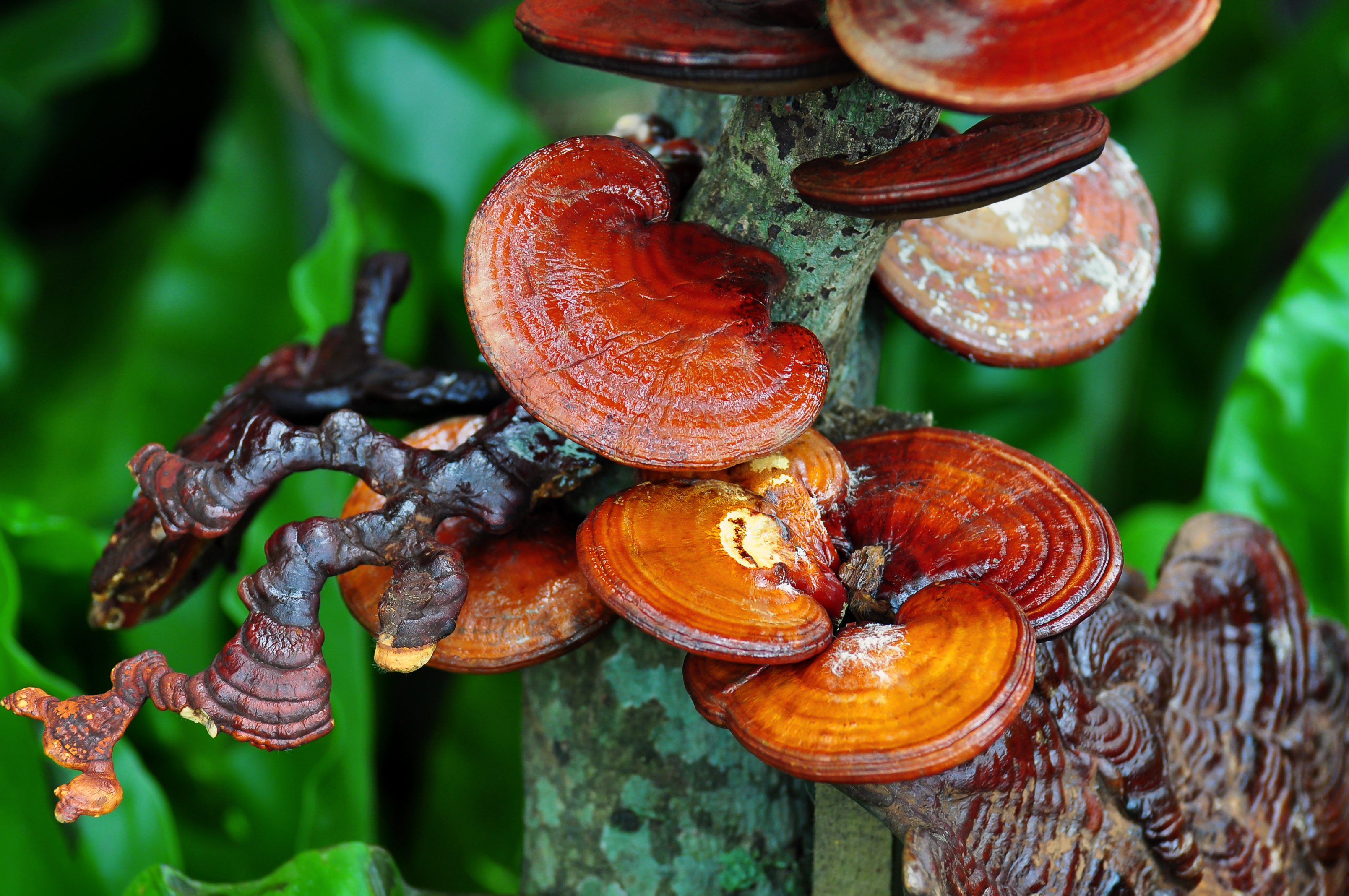Medicinal mushrooms are fast becoming a staple supplement in many peoples regimes. To help support wellbeing & vitality as well as successfully treat a myriad of health concerns. Medicinal mushrooms have been utilised in Traditional Chinese Medicine (TCM) for hundreds, if not thousands, of years. Over the past few decades a number of clinical studies, both human & animal, have concluded that many of the active components in these nutritionally functional foods do, in fact, have the potent pharmacological activity that traditional knowledge has understood for centuries.
What’s interesting about medicinal mushrooms is they all appear to possess tonifying properties. By definition a tonic is a substance than improves the tone, vigor & function of the whole body. With that being said each of the mushrooms contain specific functions unique to the biochemistry of that plant, making them all both effective specifically & systemically. Another one of the more unique qualities of the medicinal mushrooms are the variety of polysaccharides they each contain. Polysaccharides have been found to elicit a broad range of beneficial actions including anti-inflammatory, hypoglycaemic (blood glucose regulating), antitumorigenic, immune stimulating & anti-ulcer.
In Part 1 of this series we will be briefly discussing 4 commonly used & clinically researched mushrooms & what’s sets each apart. Watch out for Part 2 where we will discuss 4 more clinically research medicinal mushrooms.
Reishi
Immuno-modulatory, Anti-inflammatory, Antioxidant, Tonic, Anti-fatigue, Nervine, Blood Glucose Control, Hepatoprotective, Calming, Hypnotic
Ganoderma lucidum, commonly known as Reishi, has been used in TCM for centuries & regarded as the “herb of spiritual potency”, symbolising longevity, success & divine powers. It has been commonly used as an adaptogenic compound that helps to strengthen & support many aspects of human health including gastrointestinal/digestive, respiratory, metabolic & nervous system function.
Reishi has long been known for it’s relaxing & sleep supportive properties. Clinical research has now shown Reishi to play a protective role in nervous system health with great potential to prevent the onset of neuro-degenerative conditions such as Alzheimers & Parkinsons disease. It is thought to do this by reducing pro-inflammatory markers released from the central nervous system in order to prevent & mitigate the onset of neuro-inflammation, one of the leading causes of neuro-degeneration. Reishi has also been shown to specifically protect dopaminergic neurons against oxidative stress & inflammation in order to promote efficient function of these junctions. Dopamine is most well-known for it’s role in mental health, motor control, addictive issues as well as the onset of Parkinson’ Disease.
There is also considerable evidence to support the immune stimulatory activity of Reishi, to improve host immunity & resistance to illness, suppress tumour cell replication, as well as prevent proliferation of bacterial & viral infections.
Shiitake
Tonic, Adaptogenic, Cardio-protective, Immuno-modulating, Antimicrobial, Nutritive
Possibly one of most well-known & used of the medicinal mushrooms. Shiitake mushroom are one of the most cultivated & consumed medicinal mushroom. Traditionally Shiitake mushrooms were utilised as a tonic to treat a variety of different ailments including aches & pains, fatigue, intestinal worms & cardiovascular health.
Nutritionally speaking shiitake mushrooms are a rich source of both copper & selenium. Copper is an essential mineral for iron metabolism, energy production & maturation of connective tissues. Selenium is essential for thyroid function, liver detoxification & antioxidant support.
Shiitake mushrooms have been found to elicit significant cardio-protective properties. In a study with 50 participants just 5 grams of shiitake mushroom was found to considerably lower blood levels of inflammatory messaging molecules whilst simultaneously increasing anti-inflammatory molecules. Prevention of blood vessel constriction was also seen, resulting in lowered blood pressure readings.
Polysaccharides isolated from Shiitake mushrooms were clinically shown to have anti-tumour activity in animal trials. These same polysaccharides have shown great results for the treatment of various bacterial, viral & parasitic infections confirming its activity as a potent immune modulatory agent.
Cordyceps
Metabolic, Anti-fatigue, Anti-inflammatory, Performance enhancing, Immune-modulating, Tonic, Adrenal supportive
Cordyceps is a type of caterpillar fungus, utilised for it’s potent medicinal properties for hundreds of years in China, India & Japan. It is referred to in Tibetan as Yartsa Gunbu, which translates to “grass in summer, worm in winter” & grows at 3500-5000 altitude deep in the Himalayas.
Traditionally Cordyceps was used to replenish the kidneys & soothe the lungs. It was also commonly used as a tonic for a wide variety of illnesses because of it’s ability to improve energy, stamina, appetite, endurance, libido & sleep. It was even known to have longevity & potent anti-ageing promoting properties. Various clinical trials have shown very broad biological effects in cardiovascular, renal & hepatic illness.
The ability of Cordyceps to enhance endurance & athletic performance is amongst the most researched activity it is known to possess. It was shown to have this effect by promoting fat mobilization & beta oxidation to assist with the maintenance of blood glucose during endurance exercise. It may also have the capacity to improve production of ATP (primary source of energy for the body).
Cordyceps was also found to have a clinically significant impact of fasting blood glucose levels in diabetic (type 2) mice. It was found to have protective effects on pancreatic beta-cells as well as associated complications of diabetes such as electrolyte imbalances & prevention of nephropathy.
Lion’s Mane
Nootropic, Neuroprotective, Anti-inflammatory, Immune-modulating, Antioxidant
Lion’s mane, or otherwise known as hedgehog mushroom, is well known for its beautiful white ‘mane-like’ appearance & was originally discovered in South America. It is used commonly in Chinese cuisine for its “seafood” like texture when the young plants are harvested. Medicinally, Lion’s mane has been utilised for its nootropic & brain enhancing properties.
Lion’s mane has been extensively studied for it neurotrophic activity. Studies have shown that it may be able to mitigate some of the common signs of ageing & neuronal degeneration including memory loss & difficulty focusing. It is thought to do this by increasing production of nerve growth factor (NGF) & brain-derived neurotropic factor (BDNF). These proteins promote both the growth of new cells as well as the integrity of pre-existing ones by supporting the production of myelin shealth (an essential layer surrounding nerves which promotes nerve transmission) & stimulating brain plasticity.
We currently stock a wide range of Superfeast Medicinal Mushroom & Tonic Herbs. Please come in & chat to our staff about which is the best fit for you & your health needs. Look out for Part 2, where we will discuss out next favourite 4.
References
https://scielo.conicyt.cl/pdf/ijmorphol/v35n3/art40.pdf
https://www.ncbi.nlm.nih.gov/pmc/articles/PMC3136196/
http://www.whfoods.com/genpage.php?dbid=122&tname=foodspice
https://www.sciencedirect.com/science/article/pii/S1567576904003832
https://www.sciencedirect.com/science/article/pii/S1878614616000180
https://www.ncbi.nlm.nih.gov/pmc/articles/PMC3121254/
https://www.ncbi.nlm.nih.gov/books/NBK92757/
http://www.transbiomedicine.com/translational-biomedicine/medicinal-value-of-cordyceps-sinensis.php?aid=21003
Mindy Duncan is a Bachelor qualified clinical naturopath with special interests in women’s health, menstrual & hormonal health, thyroid function & self-esteem.
Nourish Naturopathy


